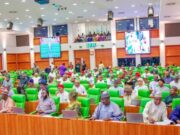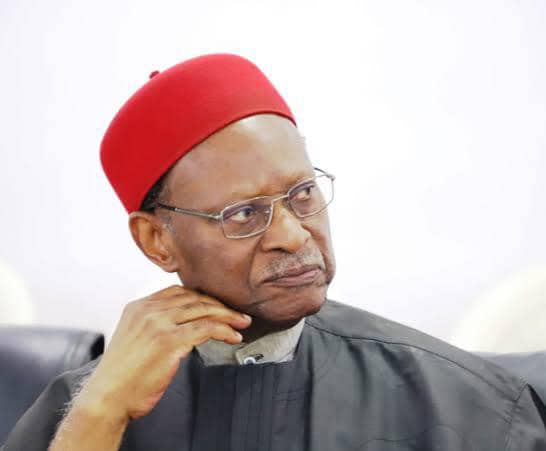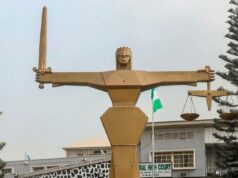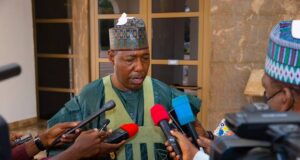Former Commonwealth Secretary-General, Chief Emeka Anyaoku, has warned that Nigeria’s continued reliance on the 1999 Constitution will prevent the country from achieving meaningful development.
Speaking at the launch of the biography The Noble Academic and Patriot: A Biography of Emeritus Professor Akinjide Osuntokun at the Nigerian Institute of International Affairs (NIIA) in Lagos on Wednesday, Anyaoku described the 1999 Constitution as a unitary document that has hindered Nigeria’s progress.

He emphasized that nations with diverse populations, like Nigeria, must adopt true federal constitutions to manage their diversity and foster unity and development.
The event, which drew notable personalities such as First Lady Senator Oluremi Tinubu, former Ekiti State Governor Dr. Kayode Fayemi, former presidential candidate, Peter Obi, media mogul Dele Momodu, and others, focused on the life and legacy of Professor Akinjide Osuntokun, a distinguished academic and patriot.
Anyaoku used the occasion to stress the need for Nigeria to reform its constitution, saying that only a truly federal system would allow the country to overcome its deep-rooted challenges.
Nigeria’s Pluralism Requires True Federalism, Anyaoku Asserts
In his address, Anyaoku highlighted Nigeria’s pluralistic nature, with its many ethnic groups, languages, cultures, and religions, and the importance of addressing this diversity through a federal system.
He pointed to countries like India, Canada, and Switzerland, which have succeeded in maintaining unity and stability by adopting federal constitutions that respect their pluralism.

In contrast, he noted, countries like Yugoslavia, Czechoslovakia, and Sudan—where true federalism was lacking—eventually fragmented.
Anyaoku further argued that Nigeria’s political instability, economic underperformance, insecurity, and widespread corruption cannot be resolved without a shift to a true federal constitution.
He warned that, under the current 1999 Constitution, even divine intervention, like that of Angel Gabriel, would not be sufficient to address Nigeria’s problems.
He urged the Nigerian government and lawmakers to act swiftly to introduce a new constitution, one rooted in the principles of the 1960/1963 Constitution, which he argued was a product of careful negotiation by Nigeria’s founding fathers and led to a more stable and unified nation.
Obi Critiques Nigerian Leadership and Role Models
During the event, Peter Obi, the presidential candidate of the Labour Party in the 2023 elections, lamented the state of Nigeria’s education system and its impact on national development.
Obi criticized the country’s habit of celebrating individuals who contribute little to nation-building, suggesting that this mindset has led to a deterioration of societal values.

He pointed out the disparity between the low pay of university lecturers and the high earnings of those with criminal or dubious reputations, calling for a reassessment of Nigeria’s role models.
Fayemi Details the Making of Osuntokun’s Biography
Former Ekiti State Governor, Dr. Kayode Fayemi, who reviewed the book, shared insights into how the biography of Professor Osuntokun came to be.
He revealed that the project began in 2018 after Osuntokun’s tenure as Pro-Chancellor of Ekiti State University.
The authors, Fayemi explained, had access to Osuntokun’s archives and conducted numerous interviews with him, allowing them to produce a comprehensive account of his life.
The biography traces Osuntokun’s roots, his family’s historical role in Ekiti and Ijesa’s military resistance against the Ibadan army in the 19th century, and his father’s success as a wealthy trader who journeyed to Ghana in pursuit of wealth.
The event, which celebrated both the biography and the broader contributions of Osuntokun, underscored the importance of understanding Nigeria’s history and the need for intellectual engagement to address the nation’s current challenges.

















